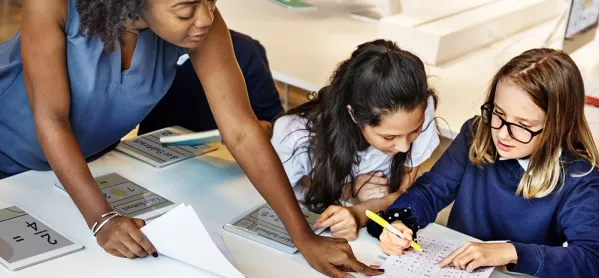- Home
- Teachers ‘unsupported and unappreciated’ in pandemic
Teachers ‘unsupported and unappreciated’ in pandemic

Almost two-thirds of teachers do not feel appreciated by the government during the coronavirus pandemic, and 59 per cent do not feel appreciated by the general public, according to new research.
The findings, by the Education Support charity, also found that 52 per cent of classroom teachers and 60 per cent of headteachers say their mental wellbeing has declined during the pandemic.
The UK-wide survey, of 3,034 education professionals in schools and colleges, also reveals a perceived lack of support for the profession - with 67 per cent of senior leaders working on site at a school or college, saying “a lack of timely government guidance was a key challenge for them throughout”.
Revealed: Worries that teachers are already ‘exhausted’
Exclusive: Teachers’ lockdown stress ‘is unsustainable’
Survey: Teacher workload and wellbeing neglected
Sinéad McBrearty, chief executive officer of Education Support, said: “At this critical point, we find that those working in schools and colleges feel poorly supported and unappreciated by government in particular.
“The education workforce has been purposeful and adaptable during the pandemic. It is time now for government to demonstrate respect, value and trust in the profession. Done well and quickly, this will provide a huge boost to morale across education.”
Senior leaders felt the most unappreciated (78 per cent), compared with school teachers (63 per cent) and those working in other roles (43 per cent).
More than half (59 per cent) of respondents said that their work was not appreciated by the general public, compared with 25 per cent who felt it was appreciated and 16 per cent who did not know.
The research, carried out between 24 June and 16 July, found teachers reported the largest decrease in their mental health (52 per cent), compared with senior leaders and staff in other roles (both 48 per cent), while 60 per cent of headteachers reported their mental health had declined.
Of those, 58 per cent sought help from family and friends, while 27 per cent sought help from peers and colleagues and 7 per cent sought help from GPs/health professionals or the NHS, while 24 per cent said they’d not accessed any help.
A spokesperson for the NAHT school leaders’ union said: “Throughout this crisis, the government has singularly failed to provide school leaders with what has been needed. A lack of timely and relevant advice, ineffective wider support systems and inadequate extra funding - all have been woefully lacking and yet each element continues to be so desperately needed. Time and time again, school leaders have delivered what has been asked of them despite, and not because of, what has been coming from the government.
“In the first few days of term, 97 per cent of schools were able to open in full to all pupils. But the failure of the Covid testing system, the refusal to fund Covid safety measures in full and allowing Ofsted inspectors back into schools so soon are all big factors that the government need to get a grip of, otherwise the successful return to school will grind to a halt.”
A Department for Education spokesperson said: “We are enormously grateful to the teachers and school staff who have gone to great lengths to ensure children can get back into their classes safely this term.
“The government has invested millions in mental health charities and in support for teachers, including a new £8 million training programme run by experts to tackle the impact of coronavirus on pupils, parents and staff, as well as funding for the Education Support Partnership to provide online peer-support and telephone supervision from experts to around 250 school leaders.
“The Wellbeing for Education Return training programme is supporting staff in schools and colleges to respond to the additional pressures some children and young people may be feeling as a direct result of the pandemic, as well as to any emotional response they or their teachers may still be experiencing.”
Keep reading for just £1 per month
You've reached your limit of free articles this month. Subscribe for £1 per month for three months and get:
- Unlimited access to all Tes magazine content
- Exclusive subscriber-only stories
- Award-winning email newsletters



